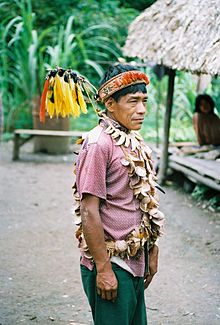Culture of South America
The culture of South America draws on diverse cultural traditions. These include the native cultures of the peoples that inhabited the continents prior to the arrival of the Europeans; European cultures, brought mainly by the Spanish, the Portuguese and the French; African cultures, whose presence derives from a long history of New World slavery; and the United States, particularly via mass culture such as cinema and TV.
Religions
Roman Catholicism is the dominant religion (over 80%-70% in Hispanic countries, some 65% in Brazil). French Guiana also has a large number of Protestants. Guyana and Suriname are exceptions, with three major religions: Christianity in general, Hinduism, and Islam. In lowland South America, as well as the Andes, animism and shamanism are common, as noted among the Urarina of Peruvian Amazonia.

Languages
Portuguese and Spanish are the primary languages of the continent. The majority of South Americans (more than 50%) speak Portuguese. However, most South American countries are Spanish-speaking, and nearly all of the continent's lusophones reside in Brazil. Among other languages used by many South Americans are:
- Aymara in Bolivia and Peru.
- Quechua in Bolivia, Ecuador, and Peru.
- Urarina in Peruvian Amazonia[1]
- Wayuu in Venezuela and Colombia.
- Guaraní in Paraguay.
- English in Guyana.
- Hakka in Suriname.
- Hindi in Guyana and Suriname.
- Dutch and Indonesian in Suriname.
- French in French Guiana
- Italian, German and Welsh in certain pockets across southern South America, such as Brazil, Uruguay, Chile & Argentina.
- Japanese in Peru and Brazil.
Music
South American nations have a rich variety of music. Some of the most famous genres include samba from Brazil, tango from Argentina & Uruguay, and cumbia from Colombia.
Art
Beyond the rich tradition of indigenous art, the development of South American visual art owed much to the influence of Spanish, Portuguese and French Baroque painting, which in turn often followed the trends of the Italian Masters. In general, this artistic Eurocentrism began to fade in the early twentieth century, as South Americans began to acknowledge the uniqueness of their condition and started to follow their own path.
Cuisine
Because of South America's ethnic mix, South American cuisine takes on European, American Indian, and African influences. The Bahia state (in Brazil) is especially well known for its West African-influenced cuisine. Peru is especially well known for its ethnic mix influences like African, American Indian, European, Chinese, Japanese, and others.
See also
References
External links
- Sounds and Colours Magazine exploring South American music and culture



